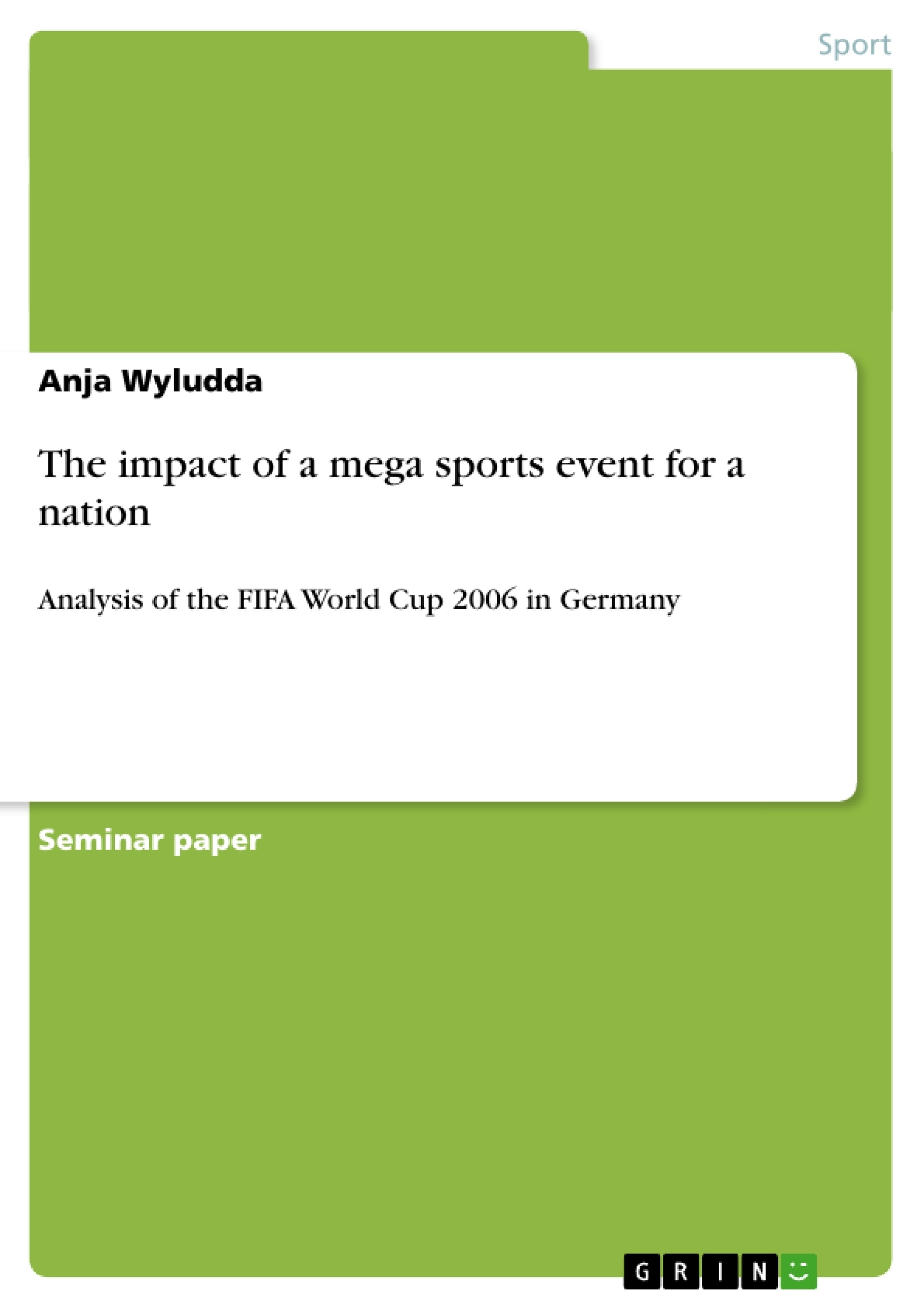The assignment answers the question which impacts a mega sports event like the FIFA World Cup 2006 in Germany can have on a nation. Cultural, environmental and economic effects – or tangible and intangible effects – are analysed in this case. The cultural impact on Germany was significant. The supporting programme of the World Cup helped to increase Germany’s reputation all over the world and improved its hospitality image worldwide. Environmental aspects were in the focus during the World Cup and several important actions helped to solve problems like waste management, water consumption and electricity consumption. The sustainability of these actions has to be observed in the future. The economic aspect was less significant. Although Germany invested large sums in infrastructure and stadiums, and had earnings of 500 million Euros from tourists, the growth in GDP is negligible. This is a general problem in large economies, because a movement of GDP needs extremely high monetary items. But in conclusion the FIFA World Cup 2006 was a success. Not from an economic point of view but with regard to international relationships and the reputation of Germany. A mega sports event needs a careful planning and a high willingness to invest money in infrastructure and venues. Then the impact can be very positive and must not be measured only from a financial point of view.
Inhaltsverzeichnis (Table of Contents)
- Executive Summary
- Introduction
- The FIFA world cup as a mega event
- Cultural and Social effects
- Fan profile
- Atmosphere and Hospitality
- Racism and Patriotism
- Cultural Supporting Programme
- Physical and Environmental effects
- Pollution and Crowd
- Infrastructure
- Employment rates
- Sustainability
- Economic Effects
- International tourism
- Economic Growth
- Company benefits
- Final balance of the Organisational Committee
- Conclusion
Zielsetzung und Themenschwerpunkte (Objectives and Key Themes)
This paper analyzes the impacts of a mega sports event, specifically the FIFA World Cup 2006 in Germany, on a nation. The paper examines the cultural, environmental, and economic effects, both tangible and intangible, of the event.- The cultural impact of the FIFA World Cup 2006 on Germany, including the event's influence on the country's reputation and its hospitality image.
- The environmental aspects of the FIFA World Cup, such as waste management, water consumption, and electricity consumption, and their sustainability.
- The economic effects of the FIFA World Cup, including international tourism, economic growth, and company benefits.
- The overall success of the FIFA World Cup 2006, considering its cultural, environmental, and economic impacts.
- The importance of careful planning and investment in infrastructure for hosting a mega sports event.
Zusammenfassung der Kapitel (Chapter Summaries)
The Executive Summary provides a concise overview of the paper's findings, highlighting the cultural, environmental, and economic impacts of the FIFA World Cup 2006 in Germany. The Introduction sets the context by outlining the controversy surrounding the impact of mega sports events and establishing the paper's focus on analyzing the cultural, environmental, and economic effects of the World Cup on Germany. Chapter 3 defines mega events and specifically explains how the FIFA World Cup differs from other mega events, emphasizing its widespread impact on the entire country. Chapter 4 examines the cultural and social effects, focusing on fan profiles and the creation of a positive atmosphere and hospitality.
Schlüsselwörter (Keywords)
The main keywords and focus topics of this paper include mega sports events, FIFA World Cup 2006, Germany, cultural impact, environmental impact, economic impact, tourism, sustainability, infrastructure, and hospitality.Frequently Asked Questions
What were the cultural impacts of the 2006 FIFA World Cup on Germany?
The event significantly improved Germany's international reputation and its image as a hospitable and open-minded nation.
Was the 2006 World Cup economically successful for Germany?
While there were earnings from tourism, the impact on the overall GDP was negligible, which is common for large economies hosting mega events.
How were environmental issues addressed during the event?
Special programs focused on waste management, water conservation, and reducing electricity consumption to make the tournament more sustainable.
What is the difference between tangible and intangible effects of mega events?
Tangible effects include infrastructure and direct revenue, while intangible effects refer to social cohesion, national pride, and international prestige.
Is massive investment in infrastructure necessary for such events?
Yes, the study concludes that careful planning and a high willingness to invest in stadiums and transport are crucial for a positive long-term impact.
- Quote paper
- Anja Wyludda (Author), 2008, The impact of a mega sports event for a nation, Munich, GRIN Verlag, https://www.grin.com/document/129645



